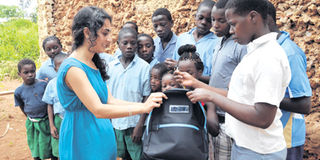Wonder bag lights up homes for pupils

Salima Mahmud Visram, 22, a fourth-year student at McGill University in Montreal, Canada displays one of the solar-powered bags to school children in Kijipwa sub-location in Kikambala, Kilifi County on December 24, 2014. Pupils will use light from the bags for their night study. PHOTO | KEVIN ODIT
What you need to know:
- “I wanted something that would be mid-way between health and education because the villagers face serious health and education challenges”, says the inventor, Salima Mahmud Visram, 22, a fourth-year student of International Development at McGill University, Montreal, Canada.
- “For three years I have been pondering how I can assist my community with a project to benefit them. I have always wanted to give back. Kikambala is where I was born and I wanted my people to benefit from my education and my invention,” said Salima.
- The initial batch of 2,000 bags have been made at a cost of over Sh2 million raised through well-wishers and Salima pledged to mobilise more local and international donors to support the project for the sake of the needy pupils in the region.
A wonder back pack is about to transform the lives of hundreds of primary school pupils in Kijipwa su-location, in Kikambala, Kilifi County.
The invention, by a Kenyan teenager studying in Canada also brings much relief to over local parents with school going children.
The gadget that has caused excitement in this part of the country is an ordinary school bag creatively fitted with a small solar panel at the back, a battery pack and light tube.
When a pupil carries the bag on the back to and from school, the solar panel captures the energy in the sun’s rays, and uses it to charge the battery pack. The stored energy would later provide the much-needed light for the pupil’s study at night with a capacity to last several hours.
For many pupils and their parents, the wonder bag is a welcome replacement for the traditional paraffin lamps known as koroboi and lanterns used in lighting up a majority of rural homes, often with negative consequences to the users’ health.
HEALTH AND EDUCATION
“I wanted something that would be mid-way between health and education because the villagers face serious health and education challenges”, says the inventor, Salima Mahmud Visram, 22, a fourth-year student of International Development at McGill University, Montreal, Canada.
We caught up with her at Maweni B Village on Tuesday, where she was demonstrating to pupils and villagers how the wonder bag works and its benefits to the learners and their families
“For three years I have been pondering how I can assist my community with a project to benefit them. I have always wanted to give back. Kikambala is where I was born and I wanted my people to benefit from my education and my invention,” said Salima.
The initial batch of 2,000 bags have been made at a cost of over Sh2 million raised through well-wishers and Salima pledged to mobilise more local and international donors to support the project for the sake of the needy pupils in the region.
Mzee David Kideri Mashaka, a village elder, hailed Salima for the initiative which he said had immense benefits to the community.
“We spend a lot of money on kerosene for our children to study. This has been a big burden for us but not anymore,” he said.
Correction, December 29, 2014
An earlier version of this story misstated the age of Salima Mahmud Visram. She is 22.





